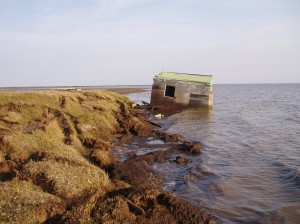The Disappearing Arctic Coastline
For this month’s collection of 15 Must-See Endangered Cultural Treasures, I wrote about Herschel Island, on the coast of the Canadian Yukon
/https://tf-cmsv2-smithsonianmag-media.s3.amazonaws.com/filer/20110520104045erosion.jpg)
For this month’s collection of 15 Must-See Endangered Cultural Treasures, I wrote about Herschel Island, on the coast of the Canadian Yukon. The island is being lost to erosion as sea level rises and storms and waves become more powerful. Herchel’s cultural treasures—such as the graves of long-dead Inuvialuit—are becoming exposed to the elements by melting permafrost. And these processes are accelerating due to climate change.
But Herschel Island is not alone. There are similar losses all around the Arctic, William Fitzhugh told me. Fitzhugh is head of the Smithsonian's Arctic Studies Center. “Lots of frozen sites are coming under melting regimes that cause huge losses to the archaeological record, just through the rising of temperatures beyond the norm of the last several thousand years,” he said.
Two new studies from the USGS confirm Fitzhugh’s assertion. The first, a paper from the February 14 issue of Geophysical Research Letters, documents the erosion rate along a 60-kilometer segment of Alaska's Beaufort Sea coast. The mean annual erosion rate doubled over the study period, from 6.8 meters per year (1955 to 1979) to 8.7 meters per year (1979 to 2002) to 13.6 meters per year (2002 to 2007). The scientists cite a familiar list of possible causes for the increase in erosion: declining sea ice, increasing sea-surface temperature in the summer, rising sea level, more powerful storms and waves.
The second study, published in the December 2008 issue of Arctic (and, as far as I can tell, not available online) documented average erosion rates at 992 sites along the Beaufort Sea and found erosion to be increasing at 60 percent of the sites. The scientists also identified a number of historical sites at risk.
Fitzhugh told me that sites throughout the Arctic are threatened, even one in Russia that has not melted in 8000 years. But as one of my sources noted, is anyone going to care about sites like these when the waves start lapping at the edges of coastal cities like New York and Washington?
/https://tf-cmsv2-smithsonianmag-media.s3.amazonaws.com/accounts/headshot/Sarah-Zielinski-240.jpg)

/https://tf-cmsv2-smithsonianmag-media.s3.amazonaws.com/accounts/headshot/Sarah-Zielinski-240.jpg)